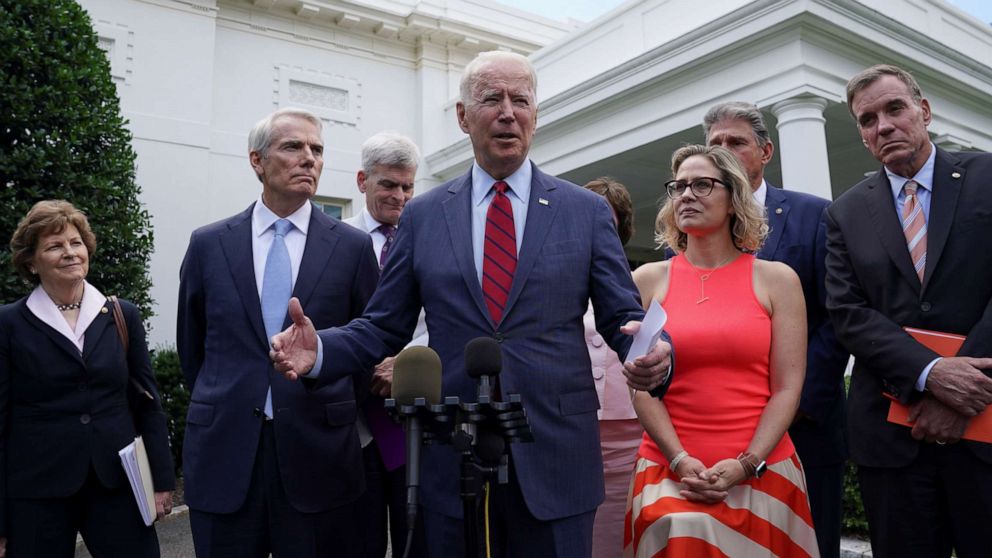


The road to passing the bipartisan infrastructure deal negotiated by senators and agreed to by the White House this week is already proving to be a rough one.
On Saturday, President Joe Biden issued a statement seeking to walk back his perceived ultimatum that his support for the $1.2 trillion bipartisan infrastructure deal was dependent on his American Families Plan also reaching his desk through reconciliation.
"I indicated that I would refuse to sign the infrastructure bill if it was sent to me without my Families Plan and other priorities, including clean energy. That statement understandably upset some Republicans, who do not see the two plans as linked," Biden said in a lengthy statement.
"My comments also created the impression that I was issuing a veto threat on the very plan I had just agreed to, which was certainly not my intent," he added.
"So to be clear: our bipartisan agreement does not preclude Republicans from attempting to defeat my Families Plan; likewise, they should have no objections to my devoted efforts to pass that Families Plan and other proposals in tandem. We will let the American people -- and the Congress -- decide."
Next week, Biden will hit the road to begin making his case for the deal directly to the American people, giving remarks on the deal during a trip to Wisconsin on Tuesday, according to a White House official.
Biden stirred up Democratic concerns and Republican ire with that suggestion he would withhold his signature on the bipartisan deal in order to ensure his sweeping human infrastructure plan was passed.
"If this is the only one that comes to me, I'm not signing it. It's in tandem," Biden told reporters Thursday, referring to the newly negotiated deal.
Since then, the White House has sought to quell concerns that the bipartisan deal was already beginning to crumble within hours of it being agreed to.
MORE: GOP senators reject Biden tying bipartisan infrastructure deal to bigger spending packageOn Friday, Steve Ricchetti and Louisa Terrell, two members of the White House team working on the bipartisan negotiations, reached out to the group of senators they struck the deal with to express Biden's continued enthusiasm for it, according to a White House aide.
Along with those behind-the-scenes assurances, Biden spoke with Arizona Sen. Kyrsten Sinema, a moderate Democrat leading the negotiations, on Friday -- a hint of concerns, even among Democrats, about Biden's strong statements.
Biden "reiterated his strong support for the compromise agreement, and they discussed his plan to try to build support for the Agreement among both Democrats and Republicans," according to a readout from the White House.
White House press secretary Jen Psaki worked to temper Biden's comments in her press conference Friday by not drawing the same sharp line in the sand as the president. When pressed on how Biden planned to ensure both deals reached his desk together, Psaki punted "the timeline and the sequencing" of the legislation to Congress -- a sentiment Biden reiterated on Saturday.
"I will ask Leader Schumer to schedule both the infrastructure plan and the reconciliation bill for action in the Senate. I expect both to go to the House, where I will work with Speaker Pelosi on the path forward after Senate action. Ultimately, I am confident that Congress will get both to my desk, so I can sign each bill promptly," he wrote.
Still, Biden's comments drew sharp backlash from Republicans like Sen. Lindsey Graham, who was initially involved in bipartisan negotiations with a larger group of 21 senators. The South Carolina senator accused the White House of getting a deal "by extortion," following criticism from Senate Minority Leader Mitch McConnell.
"It almost makes your head spin," McConnell said on the Senate floor Thursday. "An expression of bipartisanship and then an ultimatum on behalf of your left-wing base."
The administration was prepared to have some Republicans outside the negotiating group oppose the deal no matter what, according to a White House aide. At her briefing Friday, Psaki brushed off the criticism, pinning blame on Republicans for objecting to the mechanics of getting the bipartisan infrastructure bill passed rather than opposing the bill itself.
MORE: Biden, bipartisan senators say they have $1.2 trillion framework infrastructure deal"That's a pretty absurd argument for them to make. Good luck on the political front on that argument," Psaki said.
On Friday, the White House said it remains confident that the plan will be passed, and an aide sought to downplay the concerns as having been expected early on in the bipartisan deal-making process.
But Biden's cleanup on his comments to assure both Democrats and Republicans that things remain on track highlights the challenges the deal -- and bipartisanship -- faces as a whole.
"If we can't find it on infrastructure, I don't know where else we can find it," Sen. Rob Portman, R-Ohio, one of the negotiators of the deal, told The Associated Press of bipartisanship.
"I hate to say that and I don't mean to be negative, but this should be relatively easy," he added.